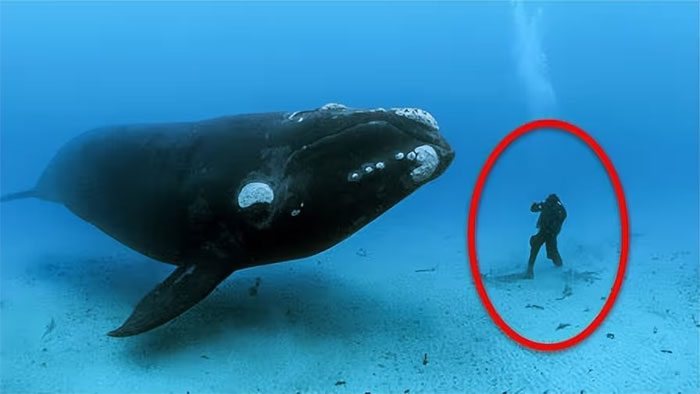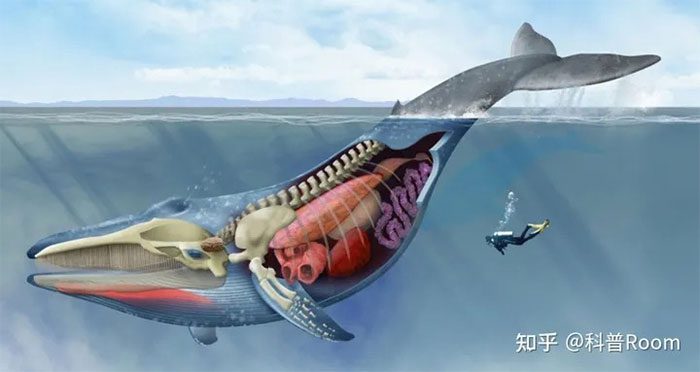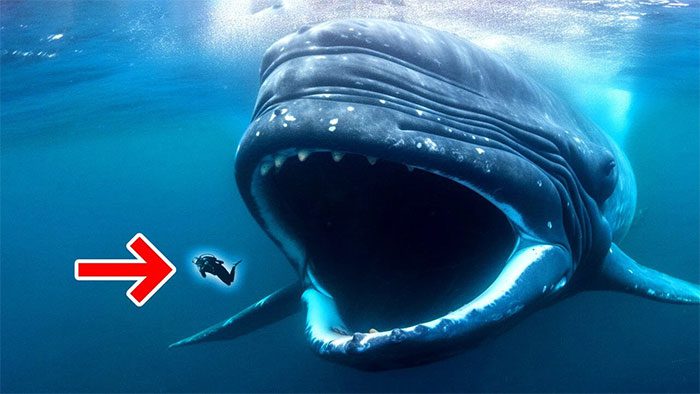Recently, a horrifying incident has captured global attention. According to new reports, a diver was accidentally swallowed by a whale and miraculously escaped unharmed!
In 2020, kayakers in California found themselves caught in the mouth of a whale while it was feeding, and in 2019, a tour operator in South Africa had a similar experience.
This news has not only shocked the entire biology community but also instilled a sense of fear concerning such incidents.
The Impact of Accidentally Entering a Whale’s Stomach on the Human Body
Let’s take a look at the whale’s digestive system. The stomach of a whale is uniquely designed and has powerful digestive capabilities. A whale’s stomach contains a large amount of gastric acid, which helps break down proteins in food into smaller molecules.
Additionally, there is an enzyme in a whale’s stomach called protease, which accelerates the breakdown of proteins. The presence of these digestive enzymes and gastric acid gives whales a powerful digestive ability that can be fatal to humans.

According to information from Cape Cod Times, Michael Packard, a commercial lobster diver, was accidentally swallowed by a humpback whale. Fortunately, the seasoned diver, aged 56, was in the whale’s mouth for about 30 to 40 seconds before the whale shook its head and spat Packard out. (Photo: Zhihu).
When a person is unfortunate enough to be swallowed by a whale and cannot escape, their body would first endure immense pressure. This pressure can lead to broken ribs, ruptured internal organs, and serious bleeding. It would be a terrifying and unimaginable experience.
Once the human body enters the whale’s stomach, it will encounter strong gastric acid and powerful digestive enzymes. The gastric acid quickly dissolves the outer layers of the body, exposing it to the digestive enzymes. These digestive enzymes break down proteins and tissue structures. This is an excruciating and horrifying process that can lead to severe pain and irreversible damage.
Even with all the pain and damage that the human body would endure in a whale’s stomach, the final outcome would still be death. The whale’s digestive process is extremely efficient and typically only takes a few hours to completely digest a human body. During this process, the human body is completely broken down into raw elements, just like any other food that the whale consumes. The whale will absorb and utilize these elements to meet its nutritional needs.

Survival is unlikely in this situation due to the whale’s extremely powerful digestive capabilities. When a human body is swallowed into a whale’s stomach, it must face intense physical stress and digestive power. (Photo: Zhihu).
Physiological and Psychological Reactions When Swallowed by a Whale
When a person is accidentally sucked into a whale’s belly, the individual’s body will endure extreme stress and confinement.
In addition to physiological reactions, the psychological state of the individual will also be significantly affected. Imagine being free to swim, only to suddenly find yourself trapped in a small chamber, losing your freedom and ability to move. In this tiny and unfamiliar environment, we would feel fear and confusion, unsure of how to escape. Sadness and despair would linger in our minds, questioning whether we would ever return to the outside world.
Beyond suffering and despair, you would also experience a sense of helplessness. This silent feeling of powerlessness would rise within you, leading to a kind of frustrated anger and a silent prayer for someone to come and rescue you.
You would endure double the pressure, both physically and mentally, being physically restricted and oppressed while feeling lost and lonely mentally.

The whale’s stomach lacks air or oxygen, making it impossible for us to breathe. Additionally, as a carnivorous creature, we would be digested by the enzymes in its stomach. (Photo: Zhihu)
In reality, the sperm whale—the largest of the toothed whales—has the ability to eat giant squids, making it theoretically capable of swallowing a human. Orcas can hunt and eat larger animals, but humans are not on their menu. To date, there have been no recorded attacks by sperm whales or orcas aimed at consuming humans.
There is a famous story about James Bartley, who lived from 1870 to 1909. The tale recounts that he was swallowed by a sperm whale and found alive several days later. He was discovered inside the whale’s stomach after it was killed with a harpoon and dissected. The story was first anonymously published in a newspaper and spread throughout America. For many years, this story has been investigated multiple times and is largely considered to be a hoax. However, no one knows for sure.


















































